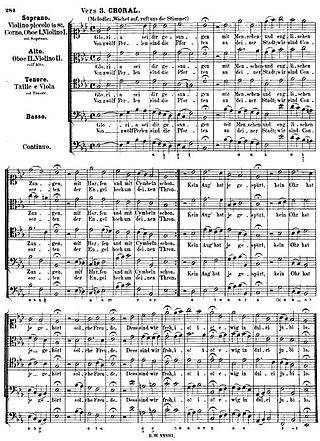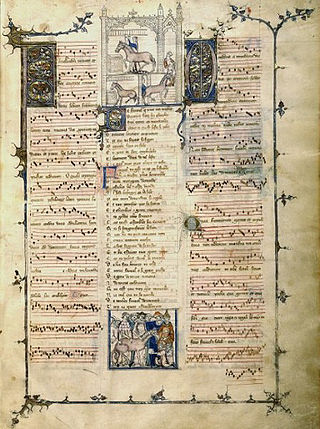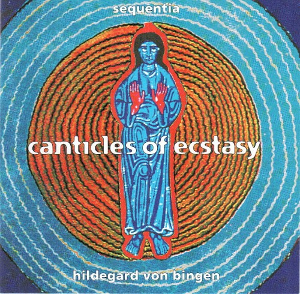Related Research Articles

Hildegard of Bingen OSB,, also known as the Sibyl of the Rhine, was a German Benedictine abbess and polymath active as a writer, composer, philosopher, mystic, visionary, and as a medical writer and practitioner during the High Middle Ages. She is one of the best-known composers of sacred monophony, as well as the most recorded in modern history. She has been considered by a number of scholars to be the founder of scientific natural history in Germany.

A Lutheran chorale is a musical setting of a Lutheran hymn, intended to be sung by a congregation in a German Protestant Church service. The typical four-part setting of a chorale, in which the sopranos sing the melody along with three lower voices, is known as a chorale harmonization. The practice of singing in unison was the rule of the reformed churches, both in Germany and in other countries.

Ars nova refers to a musical style which flourished in the Kingdom of France and its surroundings during the Late Middle Ages. More particularly, it refers to the period between the preparation of the Roman de Fauvel (1310s) and the death of composer Guillaume de Machaut in 1377. The term is sometimes used more generally to refer to all European polyphonic music of the fourteenth century. For instance, the term "Italian ars nova" is sometimes used to denote the music of Francesco Landini and his compatriots, although Trecento music is the more common term for the contemporary 14th-century music in Italy. The "ars" in "ars nova" can be read as "technique", or "style". The term was first used in two musical treatises, titled Ars novae musicae by Johannes de Muris, and a collection of writings attributed to Philippe de Vitry often simply called "Ars nova" today. Musicologist Johannes Wolf first applied to the term as description of an entire era in 1904.
Benjamin Bagby is an American singer, composer, harpist, and performer of medieval music.
Evelyn Tubb is an English soprano and early music specialist. She is a long-time member of The Consort of Musicke. Born on the Isle of Wight, she studied at the Guildhall School of Music and Drama from 1972 to 1976. Tubb has made many recordings and albums with lutenist/guitarist Michael Fields. She has taught at the Scola Cantorum Basiliensis in Basel, Switzerland.
Ordo Virtutum is an allegorical morality play, or sacred music drama, by Hildegard of Bingen, composed around 1151, during the construction and relocation of her Abbey at Rupertsberg. It is the earliest morality play by more than a century, and the only medieval musical drama to survive with an attribution for both text and music.

Robert Hugo Philip Platz is a German classical composer.
New Simplicity was a stylistic tendency amongst some of the younger generation of German composers in the late 1970s and early 1980s, reacting against not only the European avant garde of the 1950s and 1960s, but also against the broader tendency toward objectivity found from the beginning of the twentieth century. Alternative terms sometimes used for this movement are "Inclusive Composition", "New Subjectivity", "New Inwardness", "New Romanticism", "New Sensuality", "New Expressivity", "New Classicism", and "New Tonality" (neotonality).

Collegium Vocale Köln is a German vocal ensemble, founded in 1966 as a quintet when its members were still students at the Rheinische Musikschule in Cologne. It is directed by Wolfgang Fromme, who also sings tenor in the ensemble. They are best known as the group for which Karlheinz Stockhausen composed Stimmung in 1968, a work which they had performed more than three hundred of times throughout the world by 1986. The original impetus for the ensemble's founding, however, was an appearance by Alfred Deller at the Cologne Courses for Early Music, and the group has always performed both early and contemporary works.
Emmanuel Nunes was a Portuguese composer who lived and worked in Paris from 1964.
York Höller is a German composer and professor of composition at the Hochschule für Musik Köln.

Christoph Prégardien is a German lyric tenor whose career is closely associated with the roles in Mozart operas, as well as performances of Lieder, oratorio roles, and Baroque music. He is well known for his performances and recordings of the Evangelist roles in Bach's St John Passion and St Matthew Passion.
Crawford Young is an American lutenist and musicologist residing in Basel, Switzerland. He is the director of the Ferrara Ensemble, Ensemble Project Ars Nova, Shield of Harmony, and is a long time accompanist of Andreas Scholl.
Hermann Heiss was a German composer, pianist, and educator. His work was part of the music event in the art competition at the 1932 Summer Olympics.
Barbara Thornton was an American singer, musicologist, and groundbreaking performer of medieval music.
This is a bibliography of Hildegard of Bingen's works.

This is a discography of Hildegard of Bingen's musical works.

Canticles of Ecstasy is an album of sacred vocal music written in the 12th century by the German abbess Hildegard of Bingen and recorded by the early music ensemble Sequentia that was released by the Deutsche Harmonia Mundi recording label in 1993.

Barbara Stühlmeyer OblOSB is a German theologian, musicologist, author, especially a of the music of Hildegard of Bingen, and a science journalism.
Jill Feldman is an American soprano who has acquired an international reputation for her interpretation of medieval, baroque and classical repertoires.
References
Sources
- Bagby, Benjamin. 2015. "Margriet Tindemans (1951–2014)". SQ (Sequentia) website (accessed 15 March 2015).
- Neumann, Klaus L. 1999. "Barbara Thornton, 1950–98". Early Music 27, no. 1 (February): 169.
- Weber, Jerome F. 2001. "Harmonia Mundi". The New Grove Dictionary of Music and Musicians , second edition, edited by Stanley Sadie and John Tyrrell. London: Macmillan.
- Zahn, Robert von. 2001. "Cologne". The New Grove Dictionary of Music and Musicians, second edition, edited by Stanley Sadie and John Tyrrell. London: Macmillan.